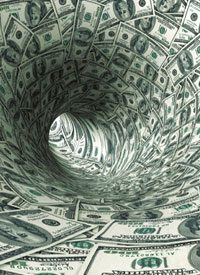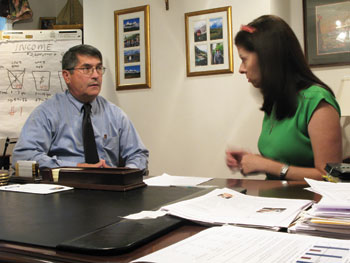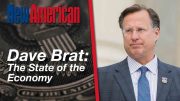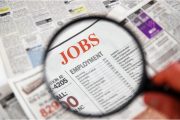
Anyone trying to figure out what in the world is going on in today’s economy might remember Agatha Christie’s classic, Murder on the Orient Express. When master sleuth Hercule Poirot boarded that train, he’d no idea that before the night ended he’d face the most perplexing murder case ever. A carful of passengers, all of whom had motive and opportunity, maneuvered around so skillfully that even Christie’s brilliant Belgian couldn’t figure out whodunit. The best he could do was point a perfectly manicured finger at the most likely culprits — in the end, everybody walked away, except the luckless victim.
When considering the train wreck of our economy, Poirot would have the same problem. Allen Rutledge (Capital Planning and Investments, Atlanta-based) has plenty to say about the collection of fiends who have all but murdered our individual portfolios. He was interviewed for The New American by Kelly Taylor Holt.
 The New American: You’ve said that rules the government has been imposing on the financial sector have actually been hindering our country’s economic recovery, not helping it. Could you explain that?
The New American: You’ve said that rules the government has been imposing on the financial sector have actually been hindering our country’s economic recovery, not helping it. Could you explain that?
Allen Rutledge: When you play tennis, and a serve lands inside the line, but it is called out of bounds, you’d ask why.
In today’s market, financiers get penalized like in our tennis example — for following the rules. If you ask why you were penalized in today’s market, the answer you get might be, “Oh, we changed the boundary line yesterday. What… you didn’t get the memo?”
Every government intervention distorts the market, and those distortions represent changes in the rules. There’s little predictability in the market because you don’t know when the next government intervention is going to happen. Even seasoned investors are afraid to play. Two questions we have are, “How come we don’t know the rules?” and “What do we do about it?”
FASB Rule 157, part of the Sarbanes-Oxley Act, changed the way banks value assets, forcing them to assign current liquid values to illiquid assets. Next thing you know, bank after bank found itself insolvent. One minute everything is hunky dory, the next moment a rule change makes everything appear insolvent. President Bill Clinton’s team instituted more rule changes. Larry Summers, then-Clinton adviser and now adviser to Obama, responded to pressure from the banking lobby, which reportedly spent $5 billion to implement these changes. The result was that a small number of banks controlled the issuance of derivatives. Summers also was involved in the Commodity Futures Modernization Act of 2000, which freed derivatives of government regulation and oversight. While as free-market advocates we oppose unconstitutional regulation, those running our government don’t mind its selective reintroduction with the understanding that the taxpayers are “on the hook” after the wild ride is over.
Concurrently, the SEC changed the net capitalization rule to allow broker dealers with over $5 billion to expand their debt equity ratio from 12 to 30 times to look more like the European model. That means they could now have 30 times as much debt as equity. An even bigger question arises, “Why do we need to emulate the European model?” Financial firms now took on more risk with higher degrees of leverage.
We also have the problem of government intervention from the past that causes problems, such as the repeal of the Glass-Steagall Act of 1933. This Depression-era law was designed to separate commercial and investment banks.
It was monetary intervention combined with regulation and re-regulation, in my opinion, that led to the massive confusion that rules the marketplace today. You can’t plan when you don’t know what the rules are.
Now that we’ve addressed some rule changes and their effects, we see President Obama asking we repeal them yet again, and add to another credit expansion. Just look at his recent initiative to revamp the lending criteria that was just corrected. We have gone from 125 percent loan to value, back to 80 percent, then back to 125 percent. There is no stability. Here we go again.
TNA: You credit your association with Representative Larry McDonald (Georgia’s 7th Congressional District) as the beginning of your real education. How did McDonald change your outlook?
Rutledge: I used to be a liberal — then one night I met Larry in my parents’ home, and he challenged me in a way that made me mad! But I got a book, then another, then another, and began to understand that something is really wrong in our country. Larry had a way of reducing economic lessons to terms even an average Joe could understand, and I learned that from him.
In short, I came to believe that government has been the happy conductor of a concert that induced greedy profit-takers to take monetary risks to benefit from the Federal Reserve’s credit expansionist policies. None of this economic calamity would have been possible without the government lead. If business owners are left alone in making decisions, the risk capital is their own — they quit doing stupid things if they want to stay in business.
Our dismal economy leads to legitimate questions about the unpredictability of the things that are happening, and how we make sound decisions.
TNA: I know you have said you see a basic lack of understanding about how a free-enterprise system should work. Is that where the questions on the economy should lead?
Rutledge: The real issue in understanding the economy is understanding philosophy and morality. And that’s where the answers lie, too! Our traditional morality presumes each person to be responsible for their decisions. The freedom we want to enjoy must be coupled with self-restraint (like subjecting ourselves to the Ten Commandments of God). It implies the return to caveat emptor (let the buyer beware) for both businessmen and consumers. Instead, most decision makers today practice Keynesian [socialist] economics, which has a flawed premise — that government should intervene in, and control, markets and protect us from ourselves. It presumes the legitimacy of central banking and asks, “How can we tweak the economy to make it better?”
Keynes proposed “spending our way to prosperity,” a belief system that will never work! Individuals cannot make their budgets work by incurring debt, and a government shouldn’t be able to do collectively what we cannot do individually. The government should take a meat axe to the budget. With Keynesian policy, credit expansion by a central bank, such as our Federal Reserve, becomes a game of musical chairs. What I mean is that with each credit expansion there is an implied contraction due to the collective “malinvestments” made by entrepreneurs. When the contractions occur people lose money because of the bad judgment in investing when the demands for goods were misread. The answer according to the Fed is not to stop causing malinvestment by manipulating credit, but is to keep the music going. I’m a student of the Austrian [free-market] school of economics; it’s sound and conservative, recognizes hard assets and holding no debt.
TNA: So are you saying that all the you’re-to-blame finger-pointing is directed at the wrong targets: the greedy private-sector hedge-fund managers, mortgage brokers, bad loans, homeowners, the greedy Madoffs of this world, etc.?
Rutledge: No one questions the government’s role in the process, which is where they should be looking. For example, Fannie Mae and Freddie Mac have been in the marketplace as government-sponsored issuers of loans. Why should they determine who gets loans and who doesn’t? It results in a distortion of the market by allowing “political correctness” to override the lender’s judgment of creditworthiness. That’s how to break the free market.
Fingers should be pointed at the Fed and government intervention in housing. The government is responsible, but blame has been focused on the private sector, like the criminal behavior of Madoff — it has deflected attention away from the government, which is guilty of the same behavior through Social Security! Madoff ran a Ponzi scheme taking “late investors’” money to pay the “early investors.” Social Security takes the younger generation’s money to pay the older generation of retirees. Madoff stole an estimated $55 billion, but Social Security may be in the red as much as $55 trillion.
By keeping interest rates artificially low, the Fed created a gigantic expansion of credit, regardless of ability to pay. Low-interest credit was given to those who were very likely to default on their loans. High-risk loans are supposed to be charged high interest rates so that banks have enough money not to fail if the loans default. But this became a political decision, not an economic one.
TNA: So what are Americans to do?
Rutledge: We no longer have truly free markets. Our whole philosophy must be rethought. For instance, if we believe that intervention is bad in the marketplace, why have we allowed bailouts, corporate takeovers, and the defrauding of people’s property rights (such as what recently happened to GM bondholders)? Would we have had this meltdown if we had gold-backed currency, thus restricting what the Fed can do to our credit system?
How do we correct what’s happened? It looks impossible. The ultimate way to recapitalize America, individually and collectively, is through savings. Lack of personal savings leads to decapitalization by dependence on government. The ultimate protection is savings, hard assets, and morality. The only way to recover is for people to return to individual responsibility. Government growth resulted from lowered responsibility! Start with your own house. Even this thought is biblical.
In fixing your own house, start with living within your means, be responsible for those who depend on you. If you have to borrow, do it prudently, for short periods of time. True capital formation comes only from savings. One failure is that of a true philosophical understanding of our responsibilities, and that is religion governs morality, which governs responsibility, which governs behavior and political choices. The two things we’re told never to discuss, religion and politics, are the only things that matter.
Do a good inventory of assets and of your value system, governed by your philosophy of responsibility and morality. If we’re going on a debt diet, we need to get on the scales every day. The circulatory system of your economy is cash flow. Your balance sheet is a measure of your height and weight. Take your assessment to a financial adviser; in seeking one, ask, “Will he respond to my needs?” Find one you can trust. Practice caveat emptor — without it, the consumer is less responsible and more vulnerable with an adviser. Ask, “Where do I not want to be?” Interview your adviser. Build integrity and unify morality to all aspects of your life.
Once your personal house is in order, demand as far as possible that your neighbor does the same by not depending on government interference to fix problems. We live today under a tyranny of tolerance. We should demand less of government, wean off the system one step at a time.
It’s simple: Less individual responsibility means more rules. If people are self-governing, with law written in their hearts, we need fewer rules. Order starts with God, then in the family. The task at hand is just being good people. To the extent that we all ignore God in our own moral codes, we’re inviting government intervention. While doing our own housecleaning, we should demand that government return to its constitutional jurisdiction and put it on a fiscal diet with strict curtailment of its present unauthorized functions. Abolishing the Fed would be a great place to start so that we can have integrity behind our money.
This report is the opinion of the author. It is not intended as and should not be used to provide investment advice, and does not address or account for individual investor circumstances. Investment decisions should always be made based on the client’s specific financial needs and objectives, goals, time horizon, and risk tolerance. Asset classes described in this report may not be suitable for all investors. Past performance is no guarantee of future results. No forecast should be considered a guarantee. Consult your financial advisor or call for more information.



